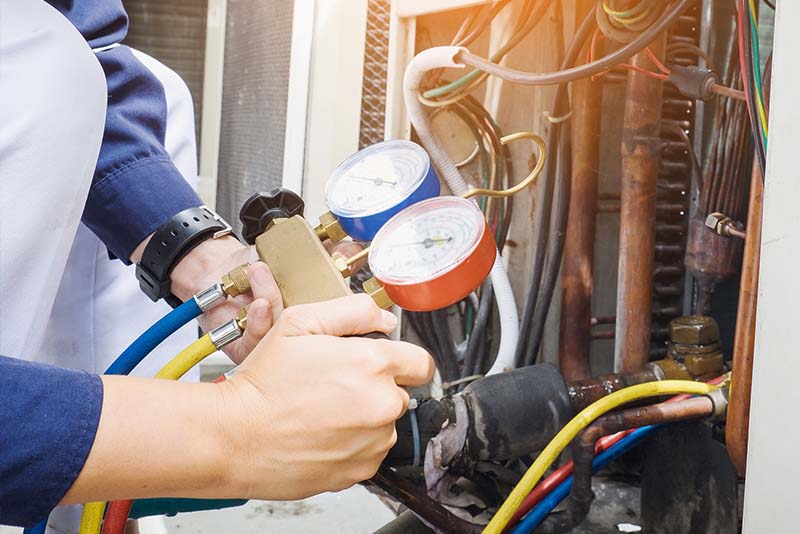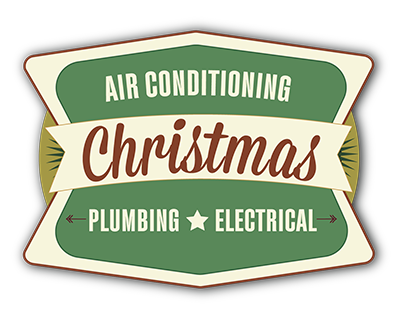Types of Air Conditioning Systems: Choosing the Right Cooling Option for Your Texas Property
Texas homeowners and business owners often face high temperatures for much of the year, making a reliable air conditioning system essential. With several types of air conditioning systems available, selecting the right one depends on property size, energy efficiency goals, and cooling needs. This guide outlines the most common residential and commercial cooling systems, highlighting their key features, benefits, and ideal applications.
Understanding the different air conditioning options helps ensure better performance, lower energy costs, and improved indoor comfort. Whether installing a new HVAC system or upgrading an existing one, it’s essential to select a system that meets the demands of Texas’ climate.
Central Air Conditioning Systems
Ductless Mini-Split Air Conditioners
Window and Portable Air Conditioning Units
Heat Pumps and Hybrid Air Conditioning Systems
Packaged Air Conditioning Units
Geothermal Cooling Systems: An Eco-Friendly Option
Factors to Consider When Choosing an Air Conditioning System

Central Air Conditioning Systems
Central air conditioning is one of the most common and widely used cooling systems in both residential and commercial settings. It provides consistent temperature control throughout the entire property using a system of ducts.
How Central AC Systems Work
A central air conditioning system utilizes a split setup comprising an outdoor compressor unit and an indoor evaporator coil. Refrigerant lines connect these components and rely on ductwork to circulate cooled air through vents in each room.
This system is designed to maintain uniform indoor temperatures, making it suitable for larger homes, office buildings, and retail spaces. Central air conditioning (AC) is typically controlled by a single thermostat, allowing for straightforward climate control throughout the entire building.
Pros and Cons of Central Air Conditioners
Pros:
- Efficient cooling for large spaces
- Better air filtration through return ducts
- Quiet operation compared to window or portable units
Cons:
- Requires ductwork, which can be costly to install or modify
- It can waste energy if ducts are poorly sealed
- This may result in uneven cooling if not correctly sized or maintained
Central air conditioners are best suited for properties that already have ductwork or those undergoing complete HVAC installations. When properly maintained, they offer dependable performance during long Texas summers.

Ductless Mini-Split Air Conditioners
Ductless air conditioning systems, also known as mini-split systems, provide a flexible alternative to traditional central air conditioning. These units are ideal for homes or businesses without existing ductwork or for spaces that require independent temperature control.
What Is a Ductless Air Conditioning System?
A ductless mini-split system consists of two main components: an outdoor compressor and one or more indoor air-handling units. These are connected by a small conduit that houses the power cable, refrigerant tubing, and condensate drain.
Each indoor unit operates independently, allowing for zoned cooling. This means different rooms or areas can be set to different temperatures based on specific comfort needs. Installation is generally less invasive compared to central systems, making ductless AC a popular choice for renovations, garages, home additions, or small offices.
Benefits of Installing a Ductless AC System in Texas Homes
Energy Efficiency
Ductless systems reduce energy loss by eliminating the need for ductwork, which can leak conditioned air. Many models are ENERGY STAR® rated and offer high SEER (Seasonal Energy Efficiency Ratio) values.
Custom Comfort Zones
Mini-splits allow for room-by-room climate control. This zoning feature is handy for families or businesses with varying temperature preferences.
Easy Installation
Because ductwork isn’t required, installation is faster and less disruptive. Most systems can be installed in a day, depending on the number of zones.
Low Operating Costs
With inverter-driven compressors and precise control, ductless air conditioners use only the energy needed, helping lower monthly utility bills.
Quiet Operation
Indoor units are designed for quiet performance, making ductless systems ideal for bedrooms, meeting rooms, and other low-noise environments.
In Texas properties where space, efficiency, or room-specific comfort is a priority, ductless mini-split systems are an excellent solution.
Window and Portable Air Conditioning Units
For smaller spaces or short-term cooling needs, window air conditioners and portable air conditioning units provide simple, cost-effective solutions. These systems are best suited for single rooms, apartments, or temporary setups where permanent installation isn’t feasible.
Window AC Units: Affordable Cooling for Small Spaces
Window AC units are self-contained systems designed to fit into a window frame or a specially built-wall slot. These air conditioners draw in outdoor air, cool it, and circulate it within a room using built-in fans.
They are typically used in bedrooms, small offices, or studio apartments and are popular for their affordability and ease of use. Most models feature simple controls, offering adjustable fan speeds and temperature settings.
Advantages:
- Low initial cost
- Easy to install and remove
- Compact and space-saving
- Ideal for renters or budget-conscious homeowners
Limitations:
- Only suitable for small areas
- Blocks window access
- Less efficient than split or central systems
Portable Air Conditioners: Convenience and Mobility
Portable air conditioning systems are floor-standing units that can be moved between rooms. They use a hose to vent hot air through a window or sliding door and plug into a standard electrical outlet.
These systems offer a flexible cooling option for temporary spaces, home offices, or older buildings where traditional air conditioning systems are not compatible.
Advantages:
- No permanent installation is required
- Easily moved from room to room
- Simple plug-and-play operation
Limitations:
- Noisy operation
- Lower cooling capacity compared to fixed units
- Requires venting and drainage maintenance
While not suitable for whole-house climate control, both window and portable AC units offer practical cooling options for short-term use or localized comfort in Texas properties.
Heat Pumps and Hybrid Air Conditioning Systems
Heat pumps and hybrid air conditioning systems offer both cooling and heating capabilities, making them a year-round solution for many Texas properties. These systems are especially beneficial in areas with mild winters and hot summers, offering energy efficiency and versatility.
A heat pump system operates by transferring heat rather than generating it. In cooling mode, it extracts warm air from inside the building and releases it outdoors. In heating mode, the process reverses, drawing heat from the outside air—even in cooler temperatures—and moving it indoors.
Heat pumps can be part of a ducted system or used in a ductless configuration, depending on the property’s layout and existing infrastructure.
Common types include:
- Air-source heat pumps
- Ductless mini-split heat pumps
- Ground-source (geothermal) heat pumps
Hybrid systems combine a heat pump with a traditional gas furnace. The system automatically switches between electric and gas operation based on outdoor temperatures, using the most efficient fuel source available at any given time.
Benefits of hybrid air conditioning systems include:
- Energy Efficiency: Reduces reliance on fossil fuels by using electric heat when possible
- Lower Operating Costs: Optimizes energy usage for both heating and cooling
- Smart Thermostat Compatibility: Easily integrates with programmable or smart thermostats for better control
- Reliable Performance in Varying Climates: Provides consistent comfort even during temperature fluctuations
Texas homeowners seeking a cost-effective, dual-purpose HVAC solution often benefit from heat pumps or hybrid systems. These units reduce the need for separate heating and cooling installations while offering dependable performance throughout the seasons.
Packaged Air Conditioning Units
Packaged air conditioning systems are all-in-one HVAC units that house the compressor, condenser, and evaporator coil in a single cabinet. These systems are typically installed outdoors—on a roof or a concrete slab adjacent to the building—and are commonly used in small commercial buildings, manufactured homes, and select residential properties.
What Is a Packaged AC System?
Unlike split systems, which separate the indoor and outdoor components, a packaged air conditioner combines all major parts into one unit. This simplifies installation and maintenance, especially when indoor space is limited.
Packaged systems can provide cooling only or include both heating and cooling capabilities, depending on the configuration. Common types include:
- Packaged air conditioners (cooling only)
- Packaged heat pumps
- Packaged gas-electric units
Pros of Using Packaged Units for Businesses
Space Efficiency
All components are contained in a single unit, saving valuable indoor space. This makes packaged systems ideal for commercial buildings, retail spaces, and multi-unit properties.
Simplified Maintenance
With the entire system located outside, technicians can perform maintenance or repairs without entering the building. This is particularly convenient for business operations that require minimal disruption.
Quick Installation
Packaged units often require less time to install than traditional split systems, making them a good option for new construction or urgent replacement projects.
Durability
Designed for outdoor exposure, packaged air conditioners are constructed with durable materials to withstand the harsh Texas weather conditions.
For business owners and homeowners with limited space or those seeking a straightforward HVAC setup, packaged air conditioning systems offer a practical and efficient solution.
Geothermal Cooling Systems: An Eco-Friendly Option
Geothermal air conditioning systems use energy stored in the ground to provide cooling and heating. These systems offer an environmentally friendly and energy-efficient solution for Texas property owners who are willing to invest in long-term savings and sustainability.
Understanding Geothermal Air Conditioning
A geothermal cooling system operates by transferring heat between the building and the ground through a series of buried pipes, known as a ground loop. Because underground temperatures remain relatively stable throughout the year, geothermal systems can efficiently absorb or release heat depending on the season.
During the summer, the system pulls heat from the indoor air and transfers it to the cooler ground. In winter, it draws heat from the earth and moves it indoors for heating.
Geothermal systems are typically connected to a central duct system, similar to conventional HVAC, and are managed with a standard thermostat.
Is Geothermal Cooling Right for Texas Properties?
High Initial Investment
Geothermal systems involve a significant upfront cost due to the need for drilling or trenching to install ground loops. However, federal and state incentives may offset part of the installation expense.
Long-Term Energy Savings
Once installed, geothermal systems offer some of the lowest operating costs among all types of air conditioning systems. They consume less electricity and significantly reduce their monthly utility bills over time.
Low Maintenance Requirements
Because most of the system is underground and protected from the elements, geothermal units have fewer mechanical failures and lower maintenance needs.
Environmentally Responsible Choice
These systems utilize renewable thermal energy from the Earth and produce fewer greenhouse gas emissions compared to conventional air conditioning units.
For new construction or property owners committed to long-term energy savings and environmental sustainability, geothermal cooling is a wise investment, even in the hot Texas climate.
Factors to Consider When Choosing an Air Conditioning System
Selecting the correct type of air conditioning system involves more than just choosing a cooling method; it also requires considering the specific needs of the space. To ensure long-term performance, comfort, and cost-efficiency, Texas homeowners and business owners should evaluate several key factors before installation or upgrade.
Size and Cooling Load Requirements
Proper system sizing is critical for performance and energy efficiency. An air conditioner that is too small will struggle to cool the space, while an oversized system will cycle on and off too frequently, wasting energy and reducing the system’s lifespan.
A professional HVAC contractor will conduct a load calculation to determine the correct system size based on:
- Square footage
- Insulation levels
- Number of windows and doors
- Local climate conditions
Energy Efficiency Ratings and SEER Values
SEER (Seasonal Energy Efficiency Ratio) measures the cooling output of a system to its energy consumption. Higher SEER ratings indicate better energy efficiency.
In Texas, where air conditioners run for much of the year, selecting a high-efficiency system can significantly reduce utility bills. Look for units that are ENERGY STAR® certified or exceed the federal minimum SEER requirement.
Installation Costs and Maintenance Needs
The upfront installation cost varies based on the system type, size, and complexity. For example, central air systems with new ductwork may cost more initially but offer better performance over time.
Routine maintenance is also crucial for keeping any system operating at peak efficiency. Some systems, like ductless mini-splits and geothermal units, require less ongoing maintenance than traditional central air systems.
Other considerations include:
- Compatibility with smart thermostats
- Noise levels
- Accessibility for repairs
- Availability of replacement parts
Making the right decision involves weighing both short-term and long-term costs, as well as performance goals for the property.
🛠️ Schedule a Professional Consultation for Air Conditioning Installation in Texas
Choosing between the different types of air conditioning systems can be challenging without expert guidance. Whether you’re installing a new unit or upgrading an existing HVAC system, the licensed professionals at Christmas Air Conditioning and Plumbing provide personalized recommendations based on your property’s size, energy goals, and cooling needs.
Serving homeowners and businesses across Texas, our team ensures every installation meets local codes and delivers reliable performance throughout the hottest seasons. Contact us today at 469-919-9928 to schedule a consultation or request a free estimate for your next air conditioning project.
